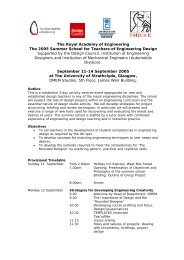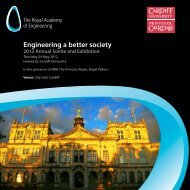The case for Centres of Excellence in sustainable building design
The case for Centres of Excellence in sustainable building design
The case for Centres of Excellence in sustainable building design
Create successful ePaper yourself
Turn your PDF publications into a flip-book with our unique Google optimized e-Paper software.
eng<strong>in</strong>eer<strong>in</strong>g skills and techniques must engage with the structural, architectural<br />
and build<strong>in</strong>g services systems eng<strong>in</strong>eer<strong>in</strong>g skills which are necessary to see them<br />
implemented <strong>in</strong> build<strong>in</strong>g <strong>design</strong>s. <strong>The</strong>re must also be relationships with the social<br />
and psychological understand<strong>in</strong>g <strong>of</strong> behaviour which is necessary to ensure that<br />
the result<strong>in</strong>g build<strong>in</strong>gs can be used <strong>in</strong> the way <strong>in</strong>tended by the <strong>design</strong>ers.<br />
In addition to supply<strong>in</strong>g a stream <strong>of</strong> MEng graduates to <strong>in</strong>dustry, centres should<br />
provide CPD, which may consist <strong>of</strong> elements <strong>of</strong> MSc programmes. Many <strong>in</strong>dustry<br />
pr<strong>of</strong>essionals possess elements <strong>of</strong> the knowledge and understand<strong>in</strong>g required as<br />
a result <strong>of</strong> the comb<strong>in</strong>ation <strong>of</strong> a good undergraduate education and appropriate<br />
experience and pr<strong>of</strong>essional development. <strong>The</strong> <strong>Centres</strong> should provide<br />
appropriately <strong>design</strong>ed MSc programmes from which modules could be taken<br />
as CPD to provide additional knowledge, depth <strong>of</strong> understand<strong>in</strong>g, and synthesis<br />
to enable them to help meet the needs identified <strong>in</strong> this report. A secondary<br />
purpose <strong>of</strong> the <strong>Centres</strong> <strong>of</strong> <strong>Excellence</strong> is to educate the general public and<br />
policymakers <strong>in</strong> the broad pr<strong>in</strong>ciples <strong>of</strong> low carbon <strong>design</strong> and <strong>in</strong> what can and<br />
cannot be achieved realistically or at reasonable cost. This role requires specific<br />
skills which are not traditional strengths <strong>of</strong> either academia or consultancy<br />
practice. Though <strong>in</strong>dividuals exist who do have these skills, the scale <strong>of</strong> the public<br />
relations and market<strong>in</strong>g work will necessitate the employment <strong>of</strong> specialists<br />
with<strong>in</strong> the <strong>Centres</strong>.<br />
Engagement with <strong>in</strong>dustry<br />
With<strong>in</strong> the construction <strong>in</strong>dustry, major advances <strong>in</strong> th<strong>in</strong>k<strong>in</strong>g are more likely to<br />
come from <strong>design</strong> practice than from academic research. Academic research is<br />
done with support from <strong>in</strong>dustry, and though the bulk <strong>of</strong> this work may be better<br />
described as ‘product development’, more fundamental work is also done which<br />
supports whole sectors <strong>of</strong> the <strong>in</strong>dustry rather than just <strong>in</strong>dividual companies. An<br />
example <strong>of</strong> a centre funded by an <strong>in</strong>dustry sector to serve their common needs<br />
is the Centre <strong>for</strong> W<strong>in</strong>dow and Cladd<strong>in</strong>g Technology (CWCT) at the University <strong>of</strong><br />
Bath. A substantial proportion <strong>of</strong> the Centre’s fund<strong>in</strong>g comes from manufacturers<br />
and construction companies with large turnovers.<br />
A number <strong>of</strong> eng<strong>in</strong>eer<strong>in</strong>g research centres are supported by <strong>in</strong>dividual<br />
companies, and certa<strong>in</strong>ly do work which may eventually benefit their<br />
<strong>in</strong>dustry sector and society as a whole, as well as support<strong>in</strong>g the research and<br />
development needs <strong>of</strong> the sponsor<strong>in</strong>g companies. <strong>The</strong> BRE Trust provides<br />
contrast<strong>in</strong>g support to a range <strong>of</strong> research centres, through funded chairs and<br />
studentships, each with a broad theme. <strong>The</strong> vast majority <strong>of</strong> posts are funded<br />
by the universities or by other research <strong>in</strong>come and the range <strong>of</strong> outputs is<br />
correspond<strong>in</strong>gly broad and deep, with no connection to BRE’s tra<strong>in</strong><strong>in</strong>g and<br />
certification schemes. <strong>The</strong>se centres are focused on societal needs, and the<br />
fund<strong>in</strong>g provided by the Trust facilitates their operation. <strong>The</strong> Trust also facilitates<br />
collaboration between the <strong>Centres</strong>.<br />
CWCT provides a model <strong>for</strong> support<strong>in</strong>g the common good <strong>of</strong> an <strong>in</strong>dustry sector<br />
by the provision <strong>of</strong> <strong>in</strong>dependent, reliable guidance to <strong>in</strong>dustry practitioners<br />
through a range <strong>of</strong> channels, while the BRE Trust’s oversight <strong>of</strong> the BRE Research<br />
<strong>Centres</strong> provides a model <strong>for</strong> the proposed <strong>Centres</strong> <strong>of</strong> <strong>Excellence</strong>. A s<strong>in</strong>gle<br />
overview panel <strong>for</strong> all the <strong>Centres</strong> will give a mechanism <strong>for</strong> support<strong>in</strong>g cooperation<br />
and cross-fertilisation between them. Individual <strong>Centres</strong> <strong>of</strong> <strong>Excellence</strong><br />
must also have local management boards through which <strong>in</strong>dustrial expertise is<br />
channelled <strong>in</strong>to their operation. It would be <strong>in</strong>advisable to have manufacturers<br />
<strong>in</strong>volved <strong>in</strong> management boards because the <strong>Centres</strong> must be seen to be<br />
<strong>in</strong>dependent by politicians, their advisors, and the media. This also means that<br />
no matter how well-regarded they are, lobby<strong>in</strong>g or pressure groups, or political<br />
40 <strong>The</strong> Royal Academy <strong>of</strong> Eng<strong>in</strong>eer<strong>in</strong>g

















